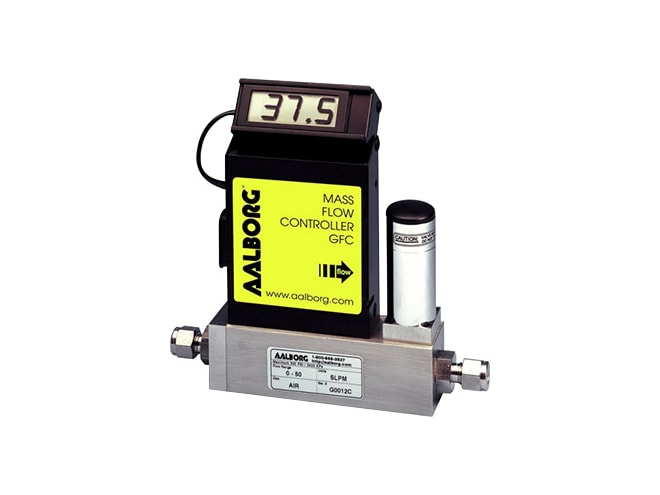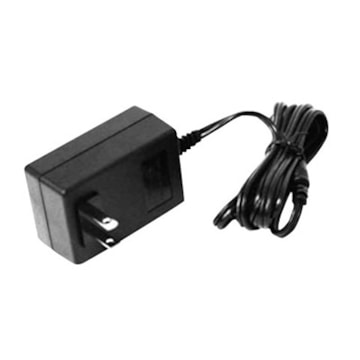
Aalborg GFC Mass Flow Controllers
Thermal mass flow controller for clean gases, flow ranges from 0 to 10 SCCM to 0 to 1000 SLPM, replaces the AA30-B.

Overview
Features
- Rigid metallic construction
- Accuracy for GFC models 17, 37 & 47
- ±1.0% of FS
- Accuracy for GFC models 57, 67 & 77
- ±1.5% of FS (at 20-100% of flow range)
- ±3% of FS (at 0-20% of flow range)
- Maximum pressure
- GFC 17, 37 and 47: 1000 PSIG (70 bar)
- GFC 57, 67 and 77: 500 PSIG (34.5 bar)
- Leak integrity maximum to the outside environment
- 1 x 10-9 smL/sec of helium
- NIST traceable certification
- Built-in tiltable LCD readout
- Local or remote setpoint control
- 0-5VDC and 4-20mA signals
- Circuit protection
- Totalizer option
Description
The Aalborg GFC mass flow controller is designed to indicate and control set flow rates of gases. The Aalborg GFC mass flow controller combines the characteristics and accuracy of conventional mass flow devices into a unique compact design at low costs previously unattainable.
Each Aalborg GFC mass flow controller incorporates an advanced straight tube sensor in conjunction with flow passage elements constructed of aluminum and brass for non-corrosive gases. For corrosive applications, a 316 stainless steel model of the Aalborg GFC mass flow controller is available. Zero and span adjustments are accessible from the transmitter exterior.
Compact and self-contained, the Aalborg GFC mass flow controller has a rugged design that is coupled with instrumentation-grade accuracy to provide versatile and economical means of flow control. Aalborg GFC mass flow controllers have readout options of either engineering units (standard) or 0 to 100% displays displays.
Each Aalborg GFC mass flow controller has a built-in electromagnetic valve which allows the flow to be set at any desired flow rate within the range of the particular model. The valve is normally closed as a safety feature to ensure that gas flow is shut off in case of a power outage. Setpoints are controlled either locally or remotely.
The Aalborg GFC mass flow controller has an LCD readout that is built into the top of the transducer and is tiltable over 90 degrees to provide optimal reading comfort. It is connected to the transducer by a standard modular plug and is readily removable for remote reading installations. Transducers without LCD readouts are available for OEM applications.
Aalborg GFC mass flow controllers are available with flow ranges from 10 sccm to 1000 sL/min N2. Gases are connected by means of 1/4", 3/8", or optional 1/8" compression fittings and 3/4" FNPT fittings. Optional fittings are available. The Aalborg GFC mass flow controller may be used as bench top units or mounted by means of screws in the base. Transducer power supply ports are fuse and polarity protected.
The Aalborg GFC mass flow meter offers a leak integrity of 1 x 10-9 smL/sec of helium maximum to the outside environment.
Principles of Operation
Metered gases are divided into two laminar flow paths, one through the Aalborg GFC mass flow controller's primary flow conduit and the other through a capillary sensor tube. Both flow conduits are designed to ensure laminar flows and, therefore, the ratio of their flow rates is constant.
Two precision temperature sensing windings on the sensor tube are heated by the Aalborg GFC mass flow controller, and when flow takes place, gas carries heat from the upstream to the downstream windings. The resultant temperature differential is proportional to the change in resistance of the sensor windings.
The Aalborg GFC mass flow controller utilizes a Wheatstone bridge design to monitor the temperature dependent resistance gradient on the sensor windings which is linearly proportional to the instantaneous rate of flow.
Output signals of 0 to 5Vdc and 4 to 20mA are generated by the Aalborg GFC mass flow controller to indicate mass molecular based flow rates of the metered gas.
The combined gas streams flow through a proportionating electromagnetic valve with an appropriately selected orifice. The closed loop control circuit continuously monitors the mass flow output and maintains it at the set flow rate. Flow rates are unaffected by temperature and pressure variations within stated limitations.
Documents
Need Help? Call a Flow engineer at 1-800-884-4967
We're open 8:00 am to 5:30 pm ET







